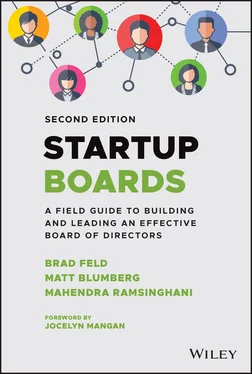Brad Feld - Startup Boards
Здесь есть возможность читать онлайн «Brad Feld - Startup Boards» — ознакомительный отрывок электронной книги совершенно бесплатно, а после прочтения отрывка купить полную версию. В некоторых случаях можно слушать аудио, скачать через торрент в формате fb2 и присутствует краткое содержание. Жанр: unrecognised, на английском языке. Описание произведения, (предисловие) а так же отзывы посетителей доступны на портале библиотеки ЛибКат.
- Название:Startup Boards
- Автор:
- Жанр:
- Год:неизвестен
- ISBN:нет данных
- Рейтинг книги:3 / 5. Голосов: 1
-
Избранное:Добавить в избранное
- Отзывы:
-
Ваша оценка:
- 60
- 1
- 2
- 3
- 4
- 5
Startup Boards: краткое содержание, описание и аннотация
Предлагаем к чтению аннотацию, описание, краткое содержание или предисловие (зависит от того, что написал сам автор книги «Startup Boards»). Если вы не нашли необходимую информацию о книге — напишите в комментариях, мы постараемся отыскать её.
Startup Boards: A Field Guide to Building and Leading an Effective Board of Directors
Startup Boards
Startup Boards — читать онлайн ознакомительный отрывок
Ниже представлен текст книги, разбитый по страницам. Система сохранения места последней прочитанной страницы, позволяет с удобством читать онлайн бесплатно книгу «Startup Boards», без необходимости каждый раз заново искать на чём Вы остановились. Поставьте закладку, и сможете в любой момент перейти на страницу, на которой закончили чтение.
Интервал:
Закладка:
Most board members in a startup represent either the investors or the founders. An independent board member represents neither group. Optimally, an independent board member will be unbiased and ultimately concerned about the company and its shareholders and stakeholders rather than the specific interests of an investor or a founder. The composition of a startup board is often specified in the company's governing documents to create a balance between investors and founders with at least one independent board member.
Data show that in venture-backed companies, board control is typically split between investors and founders more than 60% of the time, with an independent third-party director holding the tie-breaking vote. 1 If the independent director is well respected and has the trust of both the investor and founder board members, they can often act as a mediator or voice of reason when conflict arises. Jocelyn Mangan, whom you met in the Foreword, says, “One of the worst things in a company or a board is groupthink. In a world where a board needs to see around corners and make tough decisions, the voices in the conversation must come from different experiences. When the board is a founder and only investors, adding independent directors offers the opportunity to round out the conversation with the unique perspective of an operator, which in many cases is even more relevant than the heavily weighted financial perspective.”
Founders and investors should invest the time and effort to identify the right independent board members and bring them in as quickly as possible. Unfortunately, this effort is frequently deferred, often to the company's detriment. While financing documents often provide for an independent director as part of the board, this seat is often left empty due to the excitement of the new investment, the pressure to get the product out, the intensity of the work of scaling the company, or the lack of appreciation of the value of an outside director.
Board Observers
Many boards have board observers who have the right to sit in, observe, and participate in portions of the board meeting but don't have formal board roles or responsibilities. Observers don't get to vote on board matters, and are often VCs or co-founders of the company.
To limit the size of a board, many companies grant observer seats to investors. In other cases, strategic investors get observer rights instead of actual board seats to limit their control. Some strategic investors prefer board observer status, as it minimizes any liabilities their corporation may face due to actions of the board and individual board members.
VC partners who want a junior member of their firm to participate in board meetings often also ask for an observer right in addition to a board seat. In the best case, these junior members of the firm don't show up without the VC board member partner and never end up being a “proxy board member” for the actual board member. Instead, they're observers. They listen to what is going on, help support their VC partner when appropriate, and only weigh into the discussion when they have something significant from their experience to add.
Early in the life of a company, more than one founder may be on the board. As the board grows, the number of founders on the board is often reduced. While there can be a founder seat and a CEO seat, the CEO may no longer be a founder or additional founders may have observer rights.
Observers don't have a right to be in the board's executive session or closed session. Observers will respect this, but it can be taken to a ridiculous level, where there are essentially two separate board meetings. With the observers in attendance, the first one ends up being a high-level reporting session. The actual board meeting follows this, attended only by board members, where the material is again reviewed, but this time with substantive discussion. If you're going to give someone an observer seat, you should expect that they'll be in all but the most sensitive conversations.
While an entrepreneur may think they are managing the size of their board through using observer rights, we've sat in boardrooms with 20 people or more, where only five of them were board members. We've experienced VC firms who use their observer rights to “bring power to the board meeting.” Instead of one board seat, the observer seat is used to effectively have two board members. And we've been in situations where it's confusing who is a board member and who isn't.
Ultimately, it's the lead director and the CEO's responsibility to manage the observer dynamic. Creating a clear set of rules and expectations and living by them are the best way to manage and get value from board observers.
Outside Counsel
A capable lawyer from a law firm who understands startups, which we'll refer to throughout this book as outside counsel, is a powerful addition to the boardroom. While they rarely take a board seat, you should include them in all board activities. If your company is large enough to have a general counsel on your management team, you should include them in all board meetings and board activities.
Experienced outside counsel understands their role well and should give you satisfying answers to the following questions.
Will they attend all board meetings for free or at a discounted rate?
Will they maintain all corporate records?
Whom do they represent—the company, the board, investors, or the CEO?
Will they advise the CEO on relevant matters in managing the dynamic between the board, investors, and the CEO?
Will they advise the board on governance matters, especially where the board and their financial interests as investors diverge?
Will they participate in an annual board performance review?
Your outside counsel isn't just there to focus and pay attention to “legal stuff.” Following are some thoughts from Mike Platt (Cooley, Partner) on the role a lawyer can play in a company's growth.
Outside counsel plays a significant role in helping a young company grow through an IPO or an exit. Providing good legal advice is table stakes. Startup lawyers need to be business-minded, recognizing that early-stage companies must remain nimble and take considerable business risks. This shouldn't be confused with ignoring legal issues, but rather having these issues be thoughtfully discussed.
An outside counsel earns their keep by helping boards and companies with creative, and hopefully simple, solutions to complex business issues. To accomplish this, outside counsel needs the support of good board members, access to decision-makers, and involvement early in the decision-making process. If you worry that bringing your lawyer in too early will be expensive, you have the wrong lawyer.
The following are objectives a CEO and board members should expect from outside counsel.
Represent the Company and Stockholders: Counsel must provide a neutral and dispassionate perspective regarding legal matters and transactions. In many venture-backed companies, outside counsel is often the only person in the boardroom without a material financial interest in the company. Transactions often have conflicting interests between classes of stock, investors with different liquidity time horizons, and management vs. investment interests. Outside counsel facilitates open discussion of potential conflicts and helps structure transactions that maximize alignment while being explicit about conflicts.
Participate Appropriately in Board Meetings: Board meetings are a time for developing strategy and, except in the most material transactions, not for analyzing detailed and nuanced legal risks. The responsibility for keeping the dialogue at the strategy level lies with both outside counsel and the board. While outside counsel can be the guilty party for hijacking the agenda, board members often suggest concerns with “legal issues” to avoid conflict with management on more fundamental business concerns. If outside counsel is at the board meeting, they can help dismiss these attempts to avoid real issues.
Читать дальшеИнтервал:
Закладка:
Похожие книги на «Startup Boards»
Представляем Вашему вниманию похожие книги на «Startup Boards» списком для выбора. Мы отобрали схожую по названию и смыслу литературу в надежде предоставить читателям больше вариантов отыскать новые, интересные, ещё непрочитанные произведения.
Обсуждение, отзывы о книге «Startup Boards» и просто собственные мнения читателей. Оставьте ваши комментарии, напишите, что Вы думаете о произведении, его смысле или главных героях. Укажите что конкретно понравилось, а что нет, и почему Вы так считаете.












